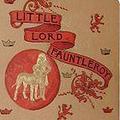Chapter 1 (3)
When he was old enough to walk out with his nurse, dragging a small wagon and wearing a short white kilt skirt, and a big white hat set back on his curly yellow hair, he was so handsome and strong and rosy that he attracted every one's attention, and his nurse would come home and tell his mamma stories of the ladies who had stopped their carriages to look at and speak to him, and of how pleased they were when he talked to them in his cheerful little way, as if he had known them always. His greatest charm was this cheerful, fearless, quaint little way of making friends with people. I think it arose from his having a very confiding nature, and a kind little heart that sympathized with every one, and wished to make every one as comfortable as he liked to be himself. It made him very quick to understand the feelings of those about him. Perhaps this had grown on him, too, because he had lived so much with his father and mother, who were always loving and considerate and tender and well-bred. He had never heard an unkind or uncourteous word spoken at home; he had always been loved and caressed and treated tenderly, and so his childish soul was full of kindness and innocent warm feeling. He had always heard his mamma called by pretty, loving names, and so he used them himself when he spoke to her; he had always seen that his papa watched over her and took great care of her, and so he learned, too, to be careful of her.
So when he knew his papa would come back no more, and saw how very sad his mamma was, there gradually came into his kind little heart the thought that he must do what he could to make her happy. He was not much more than a baby, but that thought was in his mind whenever he climbed upon her knee and kissed her and put his curly head on her neck, and when he brought his toys and picture-books to show her, and when he curled up quietly by her side as she used to lie on the sofa. He was not old enough to know of anything else to do, so he did what he could, and was more of a comfort to her than he could have understood.
"Oh, Mary!" he heard her say once to her old servant; "I am sure he is trying to help me in his innocent way--I know he is. He looks at me sometimes with a loving, wondering little look, as if he were sorry for me, and then he will come and pet me or show me something. He is such a little man, I really think he knows." As he grew older, he had a great many quaint little ways which amused and interested people greatly. He was so much of a companion for his mother that she scarcely cared for any other. They used to walk together and talk together and play together. When he was quite a little fellow, he learned to read; and after that he used to lie on the hearth-rug, in the evening, and read aloud--sometimes stories, and sometimes big books such as older people read, and sometimes even the newspaper; and often at such times Mary, in the kitchen, would hear Mrs. Errol laughing with delight at the quaint things he said.
"And; indade," said Mary to the groceryman, "nobody cud help laughin' at the quare little ways of him--and his ould-fashioned sayin's! Didn't he come into my kitchen the noight the new Prisident was nominated and shtand afore the fire, lookin' loike a pictur', wid his hands in his shmall pockets, an' his innocent bit of a face as sayrious as a jedge? An' sez he to me: 'Mary,' sez he, 'I'm very much int'rusted in the 'lection,' sez he. 'I'm a 'publican, an' so is Dearest. Are you a 'publican, Mary?' 'Sorra a bit,' sez I; 'I'm the bist o' dimmycrats!' An' he looks up at me wid a look that ud go to yer heart, an' sez he: 'Mary,' sez he, 'the country will go to ruin.' An' nivver a day since thin has he let go by widout argyin' wid me to change me polytics."

